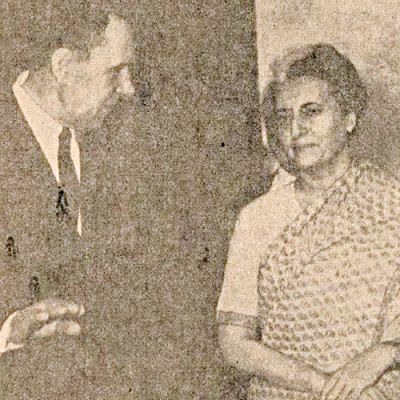Indo-Soviet treaty signed

August 9, 1971
SOVIET AND INDIA REACH ACCORD
The Soviet Union and India signed a treaty of peace, friendship and nonaggression today. The essence of the treaty was its provision that in the event of attack or the threat of attack there would be immediate mutual consultations. Each side also undertook to refrain from giving assistance to any third party taking part in armed conflict with the other party.
These clauses not only assured the prospect of Soviet assistance and support in the event of war. -- the Indo-Soviet Treaty had a far-reaching consequence for the Bangladesh war. Thereafter, the USSR began to show a clearer pro-Bangladesh tilt.
The agreement was signed by Foreign Minister Andrei A Gromyko of the Soviet Union and Swaran Singh, the Indian minister for external affairs, at a five'minute ceremony. Then, Gromyko met with India Prime Minister Indira Gandhi.
Gromyko arrived in New Delhi yesterday on a hurriedly arranged visit to demonstrate Soviet support of India in its worsening dispute with Pakistan over the Pakistan army's suppression of the independence movement in Bangladesh.
The New York Times, in an editorial published on August 10, 1971, termed this diplomatic move as "a major foreign policy coup", and said, "The decision of Moscow and New Delhi to cement their long‐time cooperation with a twenty‐year treaty undoubtedly was influenced by apprehension in both capitals about the growing rapprochement between the United States and China. But the moving factor for the Indians is certainly their desperate sense of isolation as the Pakistani civil conflict threatens to spill over their borders -- a conflict in which both Chinese and American policies appear to favor the Pakistani Government. The incredible United States decision to keep supplying arms and other aid to Pakistan in spite of the ruthless Pakistani crackdown on autonomy‐seeking Bengalis, and especially on Bengali Hindus, has handed Moscow a major foreign policy coup."
YAHYA SCHEDULES A SECRET TRIAL OF BANGABANDHU
The Martial Law Administrator's office in Rawalpindi announced today that Bangabandhu Sheikh Mujibur Rahman would be tried by a special military court for "waging war against Pakistan" and other offences.
The announcement said the trial would begin on August 11, 1971 and would be conducted in secret.
Bangabandhu would be given a chance to prepare his defence and would be provided with all facilities permitted by law, including engaging a lawyer of his own choice, provided that the lawyer is a citizen of Pakistan, the announcement said.
The government announcement did not say where the trial would be held, nor did it identify the members of the court.
Meanwhile, the Associated Press said Bangabandhu had been reported imprisoned at Mianwali, 100 miles southwest of Rawalpindi. The news agency quoted informed sources as saying he had refused an offer of a lawyer and that he contended that the military tribunal before which he was to appear was "not competent" to judge him.
ISLAMABAD INVITES GROMYKO
The Pakistan government invited Soviet Foreign Minister Gromyko to visit Pakistan. The disclosure came as Pakistan government sources said the foreign office was studying the implications of the treaty between Russia and India.
Shamsuddoza Sajen is a journalist and researcher. He can be contacted at [email protected]

 For all latest news, follow The Daily Star's Google News channel.
For all latest news, follow The Daily Star's Google News channel. 



Comments